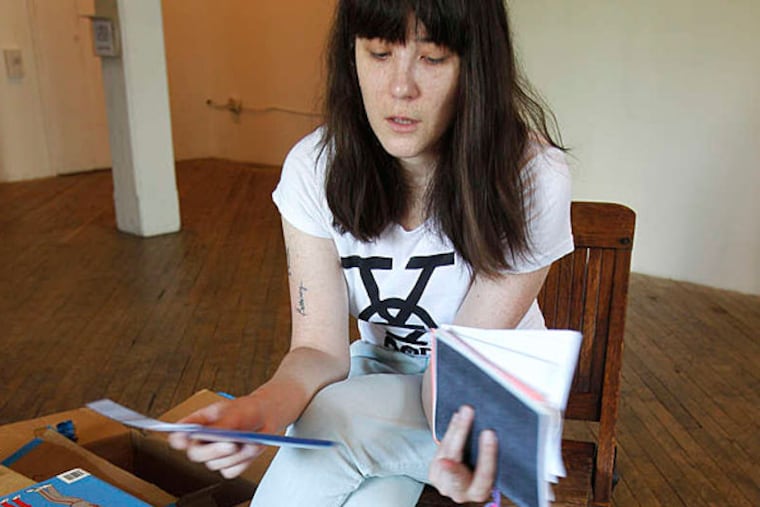New archive preserves Phila. art scene zines
When Beth Heinly was in high school, she and her friends would pass notes back and forth, draw comics and doodle - standard teenage stuff. A little less standard: They collected those notes and drawings into a 250-page zine they called The 3 O'Clock Book, and printed 500 copies.

When Beth Heinly was in high school, she and her friends would pass notes back and forth, draw comics and doodle - standard teenage stuff. A little less standard: They collected those notes and drawings into a 250-page zine they called The 3 O'Clock Book, and printed 500 copies.
Today, Heinly has one copy left. As of October, it's part of the Special Collections at Temple University Libraries.
It's part of the new Little Berlin zine archive at Temple, a project driven by Heinly, 32, who previously founded the zine library at Little Berlin, an art collective in Kensington.
"A local artist collective is beginning an archive at a local public university. I think it's inspirational," she said. She also sees the creation of the archive as an act of preservation, "so that the art scene here in Philadelphia - the artists, comic artists, theorists, journal keepers of this city, the zinesters - are not so ephemeral, but are part of a history that can be studied for years to come."
Zines, which range from photocopied, serialized publications to elaborate, hand-printed and -bound works of art, tell the story of Philadelphia's art scene over the last several decades. They're sold online, by mail, and at events like Philly Zine Fest, which returns to the Rotunda at 4014 Walnut St. on Sunday from noon to 6 p.m.
In the last few years, there has been increased interest in cataloging and preserving the works: Little Berlin recently opened a new library space for the 500 or so zines it's keeping in its collection, while across town in West Philadelphia, an independent publishing house called the Soapbox maintains a library of around 1,200 volumes.
Temple, which already had a collection of science fiction fanzines, is in the company of universities including Harvard, Duke, and Barnard in incorporating artists' zines into its collections.
"We collect zines in part because they document contemporary culture," said Margery Sly, director of Temple University Libraries' Special Collections Research Center. "They're also used extensively by Tyler School of Art students as examples and inspiration for their projects."
Heinly, who's now a member of the Vox Populi artist collective, began conversations with Temple after the Viking Mill building, where Little Berlin is located, was temporarily shuttered by the city Department of Licenses and Inspections due to code violations.
Some of the books, she discovered, had became mildewed; others were vandalized by gallery visitors. That was disheartening for Heinly, who considers the zines, many of which she bought herself or bartered for, an art collection. The works include exhibition catalogs from defunct art galleries and artist-run spaces, early projects by now well-known artists like Jayson Musson, and works by Heinly and other former and current members of the Little Berlin collective.
"Every time I go through them, I find more and more things that I love about them - and my heart breaks when I see one covered in mold," she said.
Heinly has cataloged and donated 160 zines and artist books, with about 200 more to go.
Meanwhile, Little Berlin has outfitted a new reading room and zine cart to house its own growing zine library (and invested in a dehumidifier for the upgraded space). They plan to acquire duplicates of new zines, so they can send one of each straight to Temple.
"We're trying to find a healthy balance between preserving the zines and letting them be a living breathing collection, the way zine culture intends them to be," collective member Erin Bernard said.
Along with preservation efforts, there has been some debate about whether archiving zines is a worthy goal, since they're often intended to be ephemeral.
But Heinly isn't the only one looking to preserve them. The Soapbox, run out of a private home in West Philadelphia, started a zine library since 2011, with a couple of shoe boxes full of booklets.
Donations stacked up rapidly, said cofounder Mary Tasillo, and continue to come in. The organization has a volunteer librarian, and occasionally holds cataloging parties to enter new additions into its online database.
And - despite the proliferation of alternative independent publishing channels, particularly online - she said artists keep making them, with a greater emphasis on craft than ever before, and curious readers keep showing up during the Soapbox's open hours four days per month to see what's new.
"The things that are archived here aren't always things that are going to be mainstream published. These are things that might not be at the library or at the bookstore," Tasillo said. "It's people's stories and their histories that are archived here."
215-854-5053
@samanthamelamed